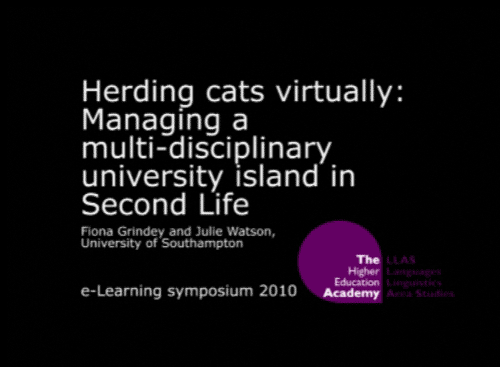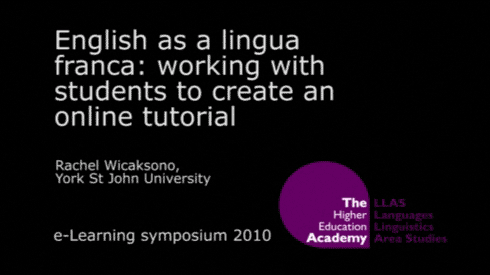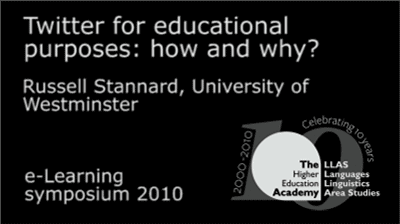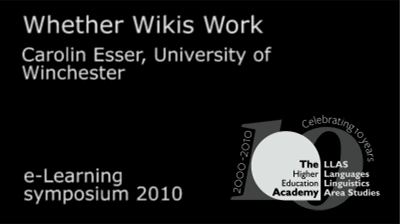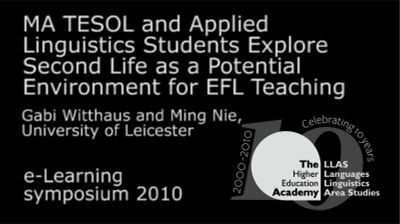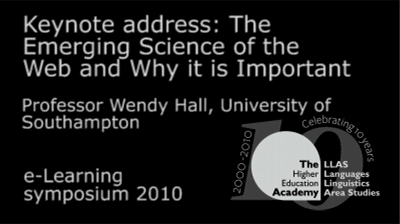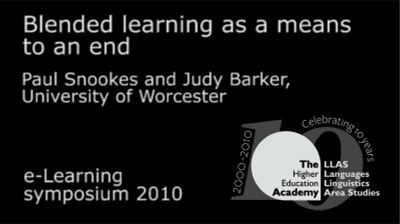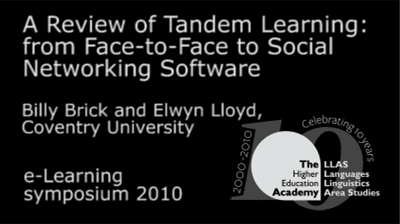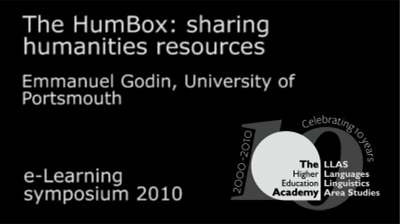e-Learning symposium 2010
Date: 28 January, 2010 - 29 January, 2010
Location: Avenue Campus, University of Southampton
Event type: Symposium
The Subject Centre's 5th Annual e-Learning symposium
Videos of sessions
All sessions were recorded and are available to view. Sessions from the main track in Lecture Theatre A are also available in a full interactive version.
To view the full interactive version all you will need to do is visit the video. Download the zip file. Unzip the folder and open the player.html file.
You may need to install Microsoft Silverlight to view the full interactive videos.
Twitter tags
Tweets about the conference used the twitter hashtag #llas_elearn2010.

This popular symposium combines practical activities and guidance with inspiring ideas to fuel the imagination.
The Subject Centre's 5th Annual e-Learning symposium will feature the following keynote speakers:
- Professor Wendy Hall DBE, FRS, FREng Professor of Computer Science at the University of Southampton
- Russell Stannard, principal lecturer in Multimedia/ICT at the University of Westminster and winner of the Times Higher Award for ‘Outstanding Achievement in ICT, 2008.’
Topics to be covered will include:
- discussion of the future of the Higher Education landscape in the online world
- exploration of how Twitter can be used for educational purposes
- Using wikis as a non-linear method of assessment
- investigation into the use of Facebook for informal language learning
- description and analysis of a university island in Second Life and how different departments make use of the virtual world
- review of the potential for using Second Life with EFL students
- presentation of an innovative blended language course reaching distant students by use of Wimba classroom and Moodle
- description and presentation of the creation of an online tutorial which explores issues around ELF (English as a lingua franca) in ELT
- analysis of two projects involved in collaboratively creating, sharing and publishing teaching and learning resources
Pre-conference workshop (28th January): Publishing your teaching resources and enhancing your professional impact

Sponsored by the OER HumBox Project.
Past events
This event follows on from the success of the e-Learning symposiums in December 2005, February 2007, January 2008, and January 2009.
| Time | Session |
|---|---|
| 10.00-10.15 | Introduction: publishing to share, open education resources in HE the story so far |
| 10.15-11.15 | Session 1: Why publish to share?
|
| 11.15-11.45 | Coffee |
| 11.45-12.45 | Session 2: How do I publish my teaching resources for open sharing?
|
| 12.45-13.30 | Lunch |
| 13.30-14.30 | Session 3: The reality of open sharing
|
| 14.30-15.45 | Session 4: Creating materials to share
|
| 15.45-16.00 | Where next?
|
| Time | Session | |
|---|---|---|
| 9.30-10.00 | Registration | |
| 10.00-10.45 | Lecture Theatre A Twitter for educational purposes: how and why? Russell Stannard, University of Westminster |
|
| 10.45-11.15 | Lecture Theatre A Whether Wikis Work: Student and Tutor Experiences in Using the wiki as a non-linear form of assessment Carolin Esser, University of Winchester |
|
| 11.15-11.45 | Coffee |
|
| 11.45-12.15 | Lecture Theatre A Parallel session 1: Herding cats virtually: Managing a multi-disciplinary university island in Second Life Fiona Grindey and Julie Watson, University of Southampton |
Lecture Theatre C MA TESOL and Applied Linguistics Students Explore Second Life as a Potential Environment for EFL Teaching Gabi Witthaus and Ming Nie, University of Leicester |
| 12.20-13.00 | Lecture Theatre A Keynote address: The Emerging Science of the Web and Why it is Important Professor Wendy Hall, University of Southampton |
|
| 13.00-14.30 | Lunch and technology showcase which will include:
|
|
| 14.30-15.00 | Lecture Theatre A Parallel session 2: Blended learning as a means to an end Paul Snookes and Judy Barker, University of Worcester |
Lecture Theatre C English as a lingua franca: working with students to create an online tutorial Rachel Wicaksono, York St John University |
| 15.00-15.30 | Lecture Theatre A Parallel session 3: A Review of Tandem Learning: from Face-to-Face to Social Networking Software Billy Brick and Elwyn Lloyd, Coventry University |
Lecture Theatre C VirtualDutch: Open Educational Resources and Distance Learning in a Less-Widely Taught Language department Ulrich Tiedau, UCL |
| 15.35-16.00 | Lecture Theatre A The HumBox: sharing humanities resources Emmanuel Godin, University of Portsmouth |
|
Abstracts
Twitter for educational purposes: how and why?
by Russell Stannard is a principal lecturer in ICT/Mutimedia at the University of Westminster and winner of the Times Higher Award for ‘Outstanding Achievement in ICT, 2008.’ His website is called TTV by Russell Stannard teacher training videos
Many people write and talk about Twitter but few really understand how it can be used as powerful marketing tool for educational content and ideas. It is ideal for making the public aware of Open Educational content and building up powerful networks with organisations and groups. I have nearly 3000 followers on the 3 Twitter accounts I run and this presentation will be a hands-on, "this is what you have to do" approach to Twitter. I will also reveal some interesting stats about the effect that Twitter and other social networking sites are having on the number of users visiting OER resources. To get a taste of the talk, read my recent article in the THE website about Twitter and OER.
Whether Wikis Work: Student and Tutor Experiences in Using the wiki as a non-linear form of assessment
by Carolin Esser is Lecturer in English at the University of Winchester
This presentation introduces a study into the use of wikis as a non-linear form of assessment in two Humanities modules at the University of Winchester. It was funded by the University Learning and Teaching Development Unit. A portfolio of preliminary questionnaires, wiki diaries, concluding interviews alongside objective module outcomes and tutor experience forms the data for this paper. Both modules and the study consciously shift attention away from the more commonly discussed collaborative potential of wikis. Instead, the emphasis lay (and lies) on the non-linear nature and the potential for formative assessment which this hypertext platform offers Higher Education. These wikis were created as individual student wikis, as opposed to group wikis, and thus emphasized the role of the student as primary author and owner of structure and content.
Herding cats virtually: Managing a multi-disciplinary university island in Second Life
by Fiona Grindey is Education Development Advisor, LATEU and Julie Watson is Senior Teaching Fellow in eLearning, Modern Languages, at the University of Southampton
The University of Southampton Island in Second Life was established in 2008, and through collaboration between the Learning and Teaching Enhancement Unit and the Communications Department is now becoming an active educational and research resource. The first part of this presentation will present an overview of the island and explain the methodology that has been used to bring together and manage a range of discipline-specific projects on the island. The second part will present an overview of one of the projects (M3: MUVE, Moodle and Microblogging), conducted by Modern Languages (ML) and demonstrate how it has contributed to the ML skybox under development on the island. Features that will be showcased include a Language Café and a range of interactive in-world learning resources for international students preparing to live and study in the UK.
MA TESOL and Applied Linguistics Students Explore Second Life as a Potential Environment for EFL Teaching
by Gabi Witthaus and Ming Nie
This paper reports on an experiment being conducted in the University of Leicester’s online MA in TESOL and Applied Linguistics programme, in which volunteer students are participating in a series of visits to Second Life (SL). The primary aim is for students to experience the use of a virtual world for language teaching, and to draw conclusions about the value that such an environment might add for EFL teaching in their own contexts. A further aim is to address the students’ expressed desire for more interaction with their peers, and for greater variety in teaching approaches on the programme.
Eighteen volunteers, located in almost as many countries, and spanning all modules on the MA, were recruited. The experiment is being carried out over a six-week period, and involves a series of structured “e-tivities” following Salmon’s (2002) five-stage model. Participants have introduced themselves on the Blackboard discussion forum and discussed their motivation for volunteering. They have also participated in inworld training sessions to learn basic technical and communication skills. Next, they will observe classes at an EFL school in SL. The observations will be followed by discussions both in Blackboard and inworld, in which students exchange views on the experience. Throughout the process, participants will be given technical support. Finally, students will be asked for their views on the use of SL as an EFL teaching environment. Findings will be reported in the presentation.
This experiment is being conducted as part of the JISC-sponsored DUCKLING (Delivering University Curricula: Knowledge INnovation Gains) project at Leicester. In addition to the findings about enhancing curriculum delivery, the project will generate a range of SL training materials and guidelines to be published as open educational resources under the auspices of the JISC- and HEA-funded OTTER (Open, Transferable, Technically Enabled Educational Resources) project at Leicester.
Bibliography
Salmon, G. (2002) E-tivities: The Key to On-Line Learning. London and New York: Routledge.
English as a lingua franca: working with students to create an online tutorial
by Rachel Wicaksono is a Senior Lecturer and Head of Programme MA TESOL, Centre for Languages and Linguistics, York St John University
As part of an 'Enquiry-based learning' project, and with support from the HEA LLAS Action Research fund, four students worked together with the Head of Programme for the MA TESOL to explore their use of English in mixed nationality group work. This involved the students in using digital audio recorders to collect classroom data and Audacity to edit their sound files, as well as in learning to transcribe and collaborating on a micro-analysis of their talk using conversation analysis-type methods. The project team used Wimba Create to build a simple but engaging online tutorial which aims to raise the awareness of university students (both British and international) to the use of English as a lingua franca in group work. The resulting tutorial uses audio, reflective video and interactive flashcards and is licensed under a Creative Commons agreement, meaning that anyone is free to use and customise the material to suit their own purposes.
This talk will demonstrate the tutorial as well as reflecting on related issues including: students preparing evidence-based learning materials, using appropriate technology to create re-usable resources and the possible implications of English as a lingua franca for UK universities.
Languages at a distance: an innovative blended course
by Paul Snookes is Language Centre Manager and Judy Barker is Language Advisor at the University of Worcester
In this presentation you will learn about how the Language Centre in the University of Worcester, in collaboration with other HE and FE educational institutions, has delivered two innovative pilot blended modern foreign language courses using Wimba Classroom and Voice embedded in Moodle. This project was designed to explore the issues involved in helping those language learners who frequently find it difficult to enrol on modern foreign language courses. Namely, those who live outside of large conurbations where lesser taught or popular advanced level face-to-face modern foreign language courses are often unavailable due to lack of demand.
VirtualDutch: Open Educational Resources and Distance Learning in a Less-Widely Taught Language department
by Ulrich Tiedau is a lecturer in Dutch at UCL
‘VirtualDutch’, an inter-institutional collaborative teaching programme involving the four university departments where Dutch is taught in the UK, aims to create and share teaching and learning resources, and to develop web-supported forms of inter-institutional collaboration in teaching and learning. The programme started in 2001, mainly in response to the declining interest in modern languages in the UK which is affecting all modern languages, but the less-widely taught languages like Dutch in particular.
A comprehensive range of Open Educational Resources has been released since the start of the programme, including self-access reading skills courses, learner’s grammars, online reference works and some thirty multimedia studypacks for autonomous learning, covering various aspects of Dutch and Flemish language, literature, history and society. Students benefit from the encounter with a wide range of learning environments, from classroom contact to multimedia language instruction via VLEs and web-based autonomous learning with the self-study-packs. They also feel part of a larger Dutch studies community in the UK, especially when they collaborate in joint teaching projects involving students and staff from all institutions.
The presentation will give an overview of the experiences of the VirtualDutch consortium with bundling existing resources and expertise by taking advantage of modern learning technologies; the experiences with using the created Open Educational Resources in blended learning contexts; and some first results from a new distance degree programme, a model which potentially may be of interest to other lesser taught LLAS subjects.
A Review of Tandem Learning: from Face-to-Face to Social Networking Software
by Billy Brick is Language Centre Manager and Elwyn Lloyd is a Lecturer in English at Coventry University
Tandem learning has a long tradition in language learning in the form of pen-pals to practise written skills, and ‘language exchange’ in the form of face-to-face spoken interaction, where native or competent non-native speakers are available for informal oral practice outside the classroom. Such activities give language learning a more immediate purpose and help to motivate and stimulate learners. The advent of the internet led to traditional ‘penpalling’ being superseded by keypalling projects, whereby learners can link up with other speakers of the target language across the globe and correspond more frequently and much more conveniently. More recent technological developments have allowed for more sophisticated media-rich web-based software to be developed, such as social networking software and virtual worlds where individuals are able to set up profiles and seek partners to exchange language skills, not only in the written mode. This presentation will review some of the issues inherent in the different approaches to language exchange and peer-to-peer teaching, and will consider the effectiveness of Web 2.0 technology for facilitating tandem learning.
The Emerging Science of the Web and Why it is Important
by Professor Wendy Hall, University of Southampton
With the advent of the internet and the World Wide Web we are able to share information as never before. The Web has become a critical global infrastructure. Since its emergence in the mid-1990s, it has exploded into hundreds of billions of pages that touch almost all aspects of modern life. Today the jobs of more and more people depend on the Web. Media, banking and health care are being revolutionized by it, and governments are even considering how to run their countries with it.
Little appreciated, however, is the fact that the Web is more than the sum of its pages and it is more than its technical protocols. Vast emergent properties have arisen that are transforming society. E-mail led to instant messaging, which on the Web has led to social networks such as Facebook and Twitter. The transfer of documents led to file-sharing sites such as Napster, which have led to user-generated portals such as blogs, Flickr and YouTube. Web 2.0, tagging content with labels, is creating online communities that share everything from concert news to health care. Looking forward we are adding to the Web of documents by creating a Web of linked data. It is our hypothesis that this will become the dominant data sharing and integration platform and that its effect on the world will be as profound and unexpected as the impact of the first Web.
As we seek to understand the origins of the Web, appreciate its current state and anticipate possible futures there is a need to address the critical questions that will determine how the Web evolves as both a social and a technical network. The emerging field of understanding these issues is becoming known as Web Science. In this talk we will explore how this new science of the Web has become established, the insights that are beginning to emerge and discuss the major research and education challenges ahead.

